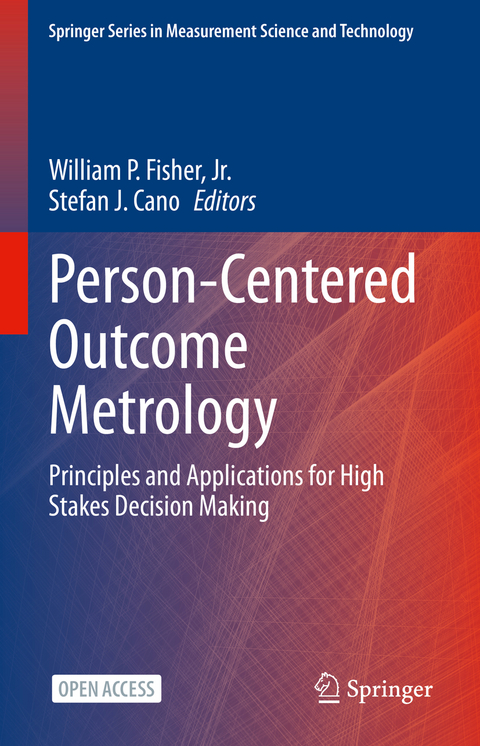
Person-Centered Outcome Metrology
Springer International Publishing (Verlag)
978-3-031-07464-6 (ISBN)
This unique collection of chapters from world experts on person-centered outcome (PCO) measures addresses the following critical questions: Can individual experiences be represented in measurements that do not reduce unique differences to meaningless uniformity? How person-centric are PCO measures? Are PCO measurements capable of delivering the kind of quality assured quantification required for high-stakes decision making? Are PCO measures likely to support improved health care delivery? Have pivotal clinical studies failed to deliver treatments for diseases because of shortcomings in the PCO measures used? Are these shortcomings primarily matters of precision and meaningfulness? Or is the lack of common languages for communicating outcomes also debilitating to quality improvement, research, and the health care economy? Three key issues form an urgent basis for further investigation. First, the numbers generated by PCO measures are increasingly used as the central dependent variables upon which high stakes decisions are made. The rising profile of PCO measures places new demands for higher quality information from scale and test construction, evaluation, selection, and interpretation. Second, PCO measurement science has well-established lessons to be learned from those who have built and established the science over many decades. Finally, the goal in making a PCO measurement is to inform outcome management. As such, it is vitally important that key stakeholders understand that, over the last half century, developments in psychometrics have refocused measurement on illuminating clinically important individual differences in the context of widely reproduced patterns of variation in health and functioning, comparable scale values for quality improvement, and practical explanatory models.
This book's audience includes anyone interested in person-centered care, including healthcare researchers and practitioners, policy makers, pharmaceutical industry representatives, clinicians, patient advocates, and metrologists.
This is an open access book.
William P. Fisher, Jr.: William is recognized for contributions to measurement theory and practice that span the full range from the philosophical to the applied across multiple fields. He received his doctorate from the University of Chicago, where he was mentored by Benjamin D. Wright, a physicist, software developer, certified psychoanalyst, and leading measurement innovator, and by David Tracy, a theologian and hermeneutic philosopher. Fisher's dissertation research was supported by a Spencer Foundation Dissertation Research Fellowship. Recent projects with the Research Institute of Sweden, Sweden's national metrology institute, and the Teaching Institute for Excellence in STEM, focus on developing and implementing metrological standards in participatory social ecologies. Stefan J. Cano: Stefan is a Chartered Psychologist and Associate Fellow of the British Psychological Society. He has 25 years' experience in person-centered outcome instrument development and psychometric research. He initially studied Psychology at University College London, UK, and later completed a PhD in Health Services Research at the London School of Hygiene & Tropical Medicine, UK, before undertaking post-doctoral research at the University College London Institute of Neurology, UK. Having previously worked extensively in qualitative and quantitative research projects, Stefan's main area of interest is in developing, applying, and improving mixed methods psychometric research in clinical studies and therapeutic trials. Stefan previously sat on the ISOQOL Board of Directors and was co-chair of the 17th Annual Conference in 2010.
Chapter 1. Ideas and Methods in Person-Centered Outcome Metrology.- Chapter 2. A Clinician's Guide to Performance 0utcome Measurements.- Chapter 3. Measuring Health-Related Quality of Life in Dementia.- Chapter 4. Improving Clinical Practice with Person-Centered Outcome Measurement.- Chapter 5. An Adaptive Strategy for Measuring Patient-Reported Outcomes.- Chapter 6. Functional Binocular Vision.- Chapter 7. Advancing the Metrological Agenda in the Social Sciences.- Chapter 8. Equating Measuring Instruments in the Social Sciences.- Chapter 9. Addressing Traceability in Social Measurement.- Chapter 10. The Role of Construct Specification Equations and Entropy in the Measurement of Memory.- Chapter 11. Assuring Measurement Quality in Person- Centered Care.- Chapter 12. Measurement Systems, Brilliant Processes, and Exceptional Results in Healthcare.
| Erscheinungsdatum | 05.12.2022 |
|---|---|
| Reihe/Serie | Springer Series in Measurement Science and Technology |
| Zusatzinfo | XII, 402 p. 88 illus., 71 illus. in color. |
| Verlagsort | Cham |
| Sprache | englisch |
| Maße | 155 x 235 mm |
| Gewicht | 742 g |
| Themenwelt | Geisteswissenschaften ► Psychologie ► Test in der Psychologie |
| Medizin / Pharmazie | |
| Naturwissenschaften | |
| Technik ► Medizintechnik | |
| Schlagworte | clinical outcome assessments • health measurement • open access • patient-centered outcomes • Patient Reported Outcomes • Psychometrics • Social measurement |
| ISBN-10 | 3-031-07464-5 / 3031074645 |
| ISBN-13 | 978-3-031-07464-6 / 9783031074646 |
| Zustand | Neuware |
| Haben Sie eine Frage zum Produkt? |
aus dem Bereich


